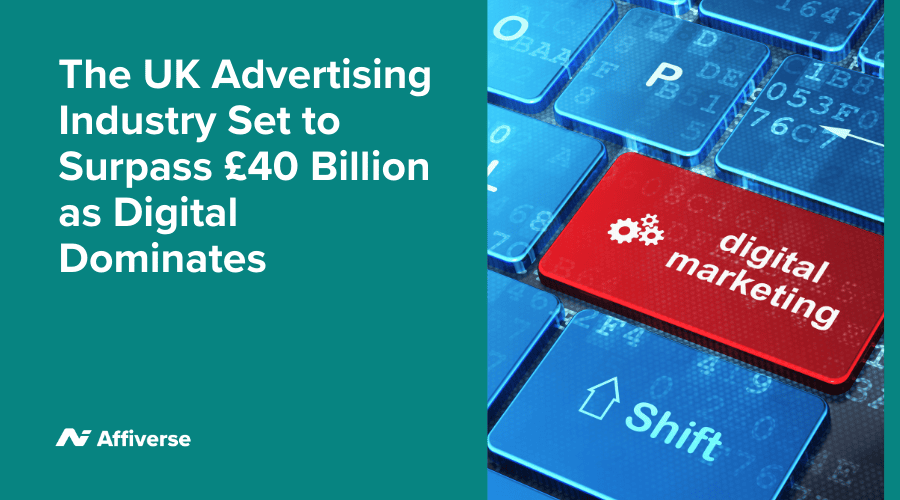The UK Advertising Industry Set to Surpass £40 Billion as Digital Dominates

The UK’s advertising sector is experiencing significant growth, with projections indicating it will surpass £40 billion in revenue this year. This expansion is being driven largely by digital advertising, which now accounts for an overwhelming majority of ad spend in the country.
As businesses continue to shift their focus to online platforms, digital marketing has become the most effective way to reach consumers. The increasing use of artificial intelligence, data-driven strategies, and automation is reshaping the industry, allowing brands to optimise their campaigns and improve return on investment.
The Rise of Digital Advertising
A major factor behind this surge in advertising revenue is the continued dominance of digital formats. Currently, digital advertising represents 81% of total UK ad spend, making the country a leader in digital adoption across Europe.
The appeal of digital lies in its ability to deliver measurable results. Unlike traditional advertising methods, which often rely on broad audience targeting, digital marketing allows brands to focus on specific demographics, interests, and behaviours. This level of precision ensures that advertising budgets are spent more efficiently, driving higher engagement and conversion rates.
Another reason for this growth is the explosion of e-commerce and mobile usage. Consumers are spending more time online, shopping through websites, apps, and social media platforms. Brands are following them, investing heavily in search engine marketing, social media ads, and programmatic display advertising to capture attention where it matters most.
Platforms such as Google, Meta (Facebook and Instagram), TikTok, and Amazon continue to dominate the UK ad market. Their ability to offer advanced targeting, real-time campaign adjustments, and data-driven insights makes them indispensable for advertisers looking to scale their efforts efficiently.
The Role of AI and Automation in Advertising Growth
Artificial intelligence is transforming the advertising industry in ways that were unimaginable just a few years ago. With AI-powered tools, brands can now automate ad placements, personalise messaging at scale, and analyse performance in real time.
One of the biggest advantages of AI-driven advertising is its ability to predict consumer behaviour. By analysing historical data, AI can determine which audiences are most likely to engage with an ad, optimising bidding strategies and creative elements to maximise results.
Chatbots and AI-powered customer service tools are also enhancing customer interactions, ensuring brands maintain engagement beyond the initial ad exposure. Instead of relying solely on traditional ad campaigns, businesses can now create fully automated marketing ecosystems that guide potential customers through the entire sales funnel.
Automation is also making programmatic advertising more effective. With AI handling ad buying and placement decisions, brands can ensure their messages are delivered to the right people at the right time, minimising wasted spend and improving efficiency.
The Shift in Consumer Behaviour
Consumer habits have changed dramatically over the past decade, with digital channels becoming the primary way people discover and interact with brands. Streaming services, on-demand content, and social media platforms have reshaped how audiences consume information, making traditional advertising methods less effective.
As a result, brands are investing more in video marketing, influencer collaborations, and interactive ad formats to keep up with changing consumption patterns. Short-form video content, particularly on TikTok, YouTube Shorts, and Instagram Reels, has become a key focus area, as brands look for ways to capture audience attention in a crowded digital space.
Retailers and e-commerce businesses are also adapting by integrating social commerce and personalised shopping experiences into their digital strategies. Ads are no longer just about brand awareness; they are designed to drive immediate purchases, often allowing consumers to buy products directly within social media apps.
Challenges Facing the Advertising Industry
Despite the impressive growth in digital advertising, the industry is not without challenges. Privacy regulations, ad-blocking technology, and changing algorithms are forcing marketers to rethink their strategies.
The introduction of stricter data protection laws and the phase-out of third-party cookies mean that advertisers must find new ways to target audiences without relying on traditional tracking methods. First-party data collection and contextual advertising are becoming more important as brands seek to maintain personalisation while respecting consumer privacy.
Ad saturation is another concern. With so many brands competing for attention online, consumers are becoming more selective about what they engage with. Marketers need to focus on high-quality, engaging content rather than just increasing ad volume. Creativity, storytelling, and authenticity will play a bigger role in determining which brands stand out in a crowded digital environment.
The Future of Advertising in the UK
As the UK advertising industry moves past the £40 billion mark, the future looks set to be driven by innovation, data, and consumer engagement.
The role of artificial intelligence will continue to expand, making marketing campaigns smarter, faster, and more cost-effective. Brands that embrace automation, machine learning, and real-time analytics will be able to adapt quickly to changing trends and consumer preferences.
We can also expect greater integration between content and commerce, with social media platforms playing a bigger role in the shopping experience. The rise of AI-generated content, voice search, and immersive ad formats like augmented reality will further reshape the digital advertising landscape.
With digital ad spend accounting for the vast majority of total advertising revenue, businesses that fail to prioritise digital-first strategies risk falling behind. As the industry grows, brands will need to focus on delivering meaningful experiences, building trust with consumers, and using technology to enhance personalisation and engagement.
For advertisers, the challenge is clear: staying ahead of the curve requires not just adopting new technologies, but also understanding the changing behaviours of digital audiences. The brands that succeed will be those that use data and creativity to deliver advertising that is not only effective but also genuinely engaging.






